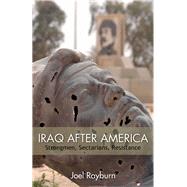Iraq after America Strongmen, Sectarians, Resistance
, by Rayburn, Joel- ISBN: 9780817916947 | 0817916946
- Cover: Hardcover
- Copyright: 8/1/2014
More than a decade after the U.S.-led invasion of Iraq, most studies of the Iraq conflict focus on the twin questions of whether the United States should have entered Iraq in 2003 and whether it should have exited in 2011, but few have examined the new Iraqi state and society on its own merits. Iraq after America examines the government and the sectarian and secular factions that have emerged in Iraq since the U.S. invasion of 2003, presenting the interrelations among the various elements in the Iraqi political scene. The book traces the origins of key trends in recent Iraqi history to explain the political and social forces that produced them, particularly during the intense period of civil war between 2003 and 2009. Along the way, the author looks at some of the most significant players in the new Iraq, explaining how they have risen to prominence and what their aims are. The author identifies the three trends that dominate Iraq’s post-U.S. political order: authoritarianism, sectarianism, and Islamist resistance, tracing their origins and showing how they have created a toxic political and social brew, preventing Iraq’s political elite from resolving the fundamental roots of conflict that have wracked that country since 2003 and before. He concludes by examining some aspects of the U.S. legacy in Iraq, analyzing what it means for the United States and others that, after more than a decade of conflict, Iraq’s communities—and its political class in particular—have not yet found a way to live together in peace.







